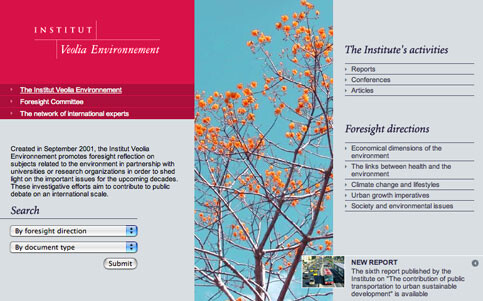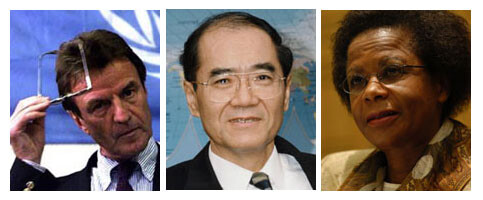The Electronic Intifada 8 December 2006

The Institut Veolia Environnement is founded and funded by Veolia, the company that is involved in the development of an illegal Israeli tramline in occupied East Jerusalem. A number of international experts that contribute to the institute have shown respect for international law and human rights in the past. It is likely that they are not aware of the Veolia’s role in the Israeli occupation of the Palestinian territories. This appeal is written to inform the international experts and to call on them to distance themselves from the illegal practice of Veolia and end their collaboration with the institute.
Institut Veolia Environnement
The Institut Veolia Environnement is a non-profit organisation that was founded in September 2001 at the initiative of the Chairman and Chief Executive Officer of Veolia Environnement, Mr. H. Proglio. The aim of the institute is ‘to propose a forum for dialogue and interchange with academia, institutions and the different actors in society’.1 The French multinational corporation Veolia Environnement is active in the areas of water, waste, energy and transportation.
The founding members of the Institut Veolia Environnement are Veolia Environnement, Veolia Water, Veolia Environmental Services, Veolia Energy, Veolia Transportation and the Urban Environment Institute (IEU). The founding members fund the institute and monitor its activities.
Veolia and the illegal tramline
According to international law, an occupying power is not allowed to annex or drastically change the infrastructure in the territories it occupies. The advisory opinion of the International Court of Justice in July 2004 confirmed that Israel is an occupying power and that building the Wall and Jewish settlements in occupied Palestinian territories is illegal. However, the tramline project runs through the occupied Palestinian territories. Veolia’s involvement in the tramline will make the company complicit in Israel’s violations of international law.2
Veolia received a lot of criticism since it first announced its intentions to become involved in the illegal project. President of the Palestinian Authority Mahmoud Abbas and French President Jacques Chirac discussed Veolia’s problematic partnership in the tramline project already in the summer of 2005.3 Amnesty International France highlighted the unlawfulness of the construction of the tramline in East Jerusalem in a public statement of 1 March 2006.4
The Ireland Palestine Solidarity Campaign (IPSC) revealed in August 2006 that Veolia Transport Ireland had called off plans to train Israeli personnel to operate a similar tramline in East Jerusalem, following trade union protests inspired by the IPSC.
The European Jews for a Just Peace voiced their disagreement with Veolia on the issue and French activists protested at Veolia’s shareholders meeting this year.
In November the Dutch ASN Bank ended its relationship with Veolia and wrote to Veolia:
“…. We believe that Veolia’s involvement in the light rail project is not in line with the UN’s demand to stop all support for Israel’s settlement activities, and is therefore not in line with ASN Banks’ social criteria. Due to the direct nature of Veolia’s involvement (through a 5% stake in the consortium and as future operator), we are of the opinion that Veolia’s activities in Jerusalem are in conflict with UN Resolutions. Therefore, on this current information Veolia will be removed from our investment universe.”
Appeal to international experts
Six international experts are involved in a so called ‘foresight committee that participates in the definition of the major avenues of research and contributes to the debates led by the the Institute’. Seventeen international experts participate in the network of the institute and bring their expertise.

Bernard Kouchner (L), Koíchiro Matsuura (M), Mamphela Ramphele (R)
It is likely that the international experts are not aware of Veolia’s involvement in the illegal tramline project in East Jerusalem. A number of them have a track record of respect for international law and human rights, for instance:
Mamphela Ramphele, a South African-born medical doctor, former director-general of the World Bank, member of the Foresight Committee of the Institut Veolia Environnement
Jack Jones, World Health Organization, School Health Specialist Department of Chronic Disease and Health Promotion
Bernard Kouchner, former French Minister of Health, founder of Medecins Sans Frontieres and former Special Representative to the head of the United Nations Mission in Kosovo.
Freddy Karup Pedersen, until recently President of the Danish Red Cross. In the past he criticised Israel for the collective punishment of the Palestinians in Gaza5
Koichiro Matsuura, Director-General of UNESCO since 1999.
An appeal is made to all the international experts collaborating with Institut Veolia Environnement to inform yourself about the illegal Israeli tramline project in east Jerusalem. You can take a stand in favour of justice by ending your relationship the Institut Veolia Environnement, just like ASN Bank did with Veolia.
To make sure that you have access to this information a copy of this article has been sent to Mr. G. Valentis, the managing director of Institut Veolia Environnement with the request to send it to you.
This call can be supported by activists in the countries concerned and by Palestinian organisations.
Adri Nieuwhof is a consultant and human rights activist who, in the eighties, was involved in numerous BDS projects for the Netherlands Committee on Southern Africa (KZA).
Endnotes
[1] The Institut Veolia Environnement
[2] Stop the Wall
[3] Principled Dutch ASN Bank ends relations with Veolia, Adri Nieuwhof (26 November 2006)
[4] Amnesty International (France)
[5] Danish Palestinian Friendship Association
Related Links





